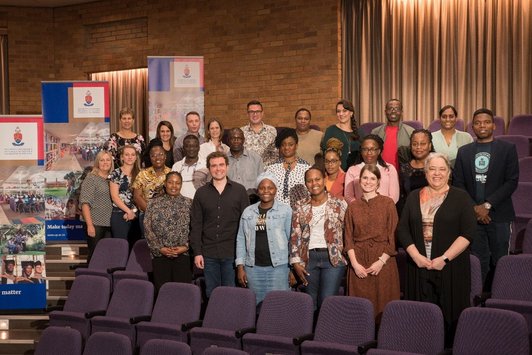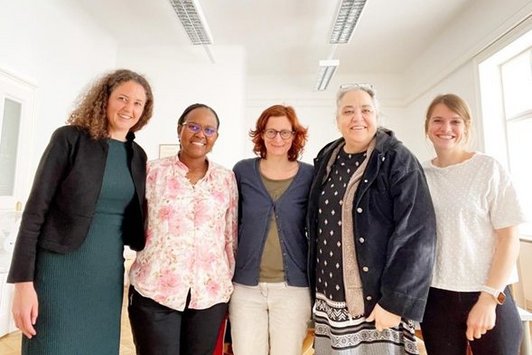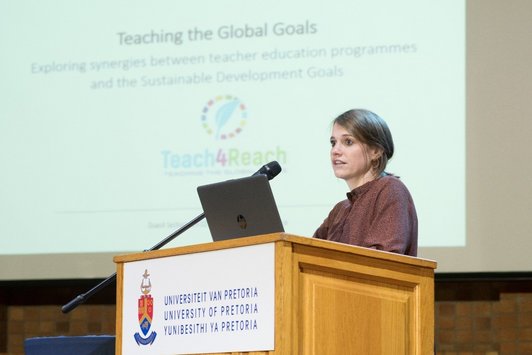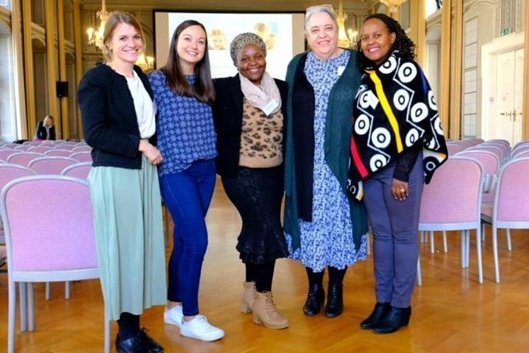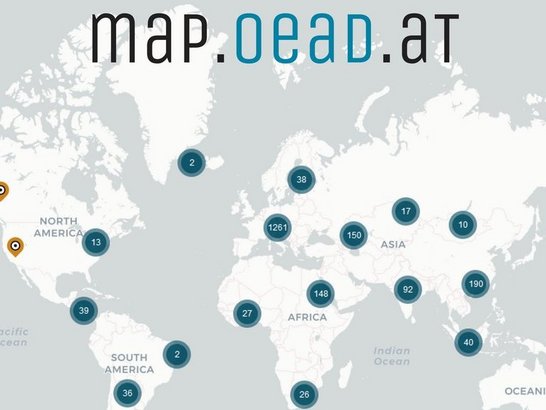
Project completed: P008_South Africa
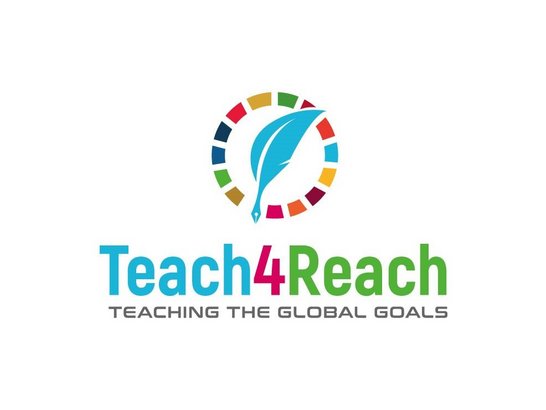
Teaching the Global Goals: Exploring synergies between teacher education programmes and the Sustainable Development Goals
Cooperating countries: South Africa and Austria
Coordinating institution: University of Pretoria (South Africa), Prof. Irma Eloff, irma.eloff@up.ac.za
Partner institutions: University of Innsbruck (Austria), University of Vienna (Austria)
Project duration: 1 April 2021 - 31 March 2023
Budget: EUR 28.950
Abstract:
This research project will explore how teacher education programmes in the Global South and the Global North can be leveraged to support the Sustainable Development Goals by:
- Raising awareness about the SDGs in teachers and teacher educators
- Crafting future-focused research agendas on quality education, gender equality, reducing inequality and good health and wellbeing
- Building international collaborative networks to support the SDGs
- Supporting scientific knowledge development on the SDGs in the education domain
Currently, only 7% of Teacher education programmes worldwide cover education for sustainable development (Global Education Monitoring Report, 2017/8; Accountability in Education, pp. xvii). This project seeks to expand the curricula on Sustainable development and the Global Goals in teacher education programmes as a strategic initiative to impact on and optimally support Agenda2030.
The project is led by an all women team of researchers from the University of Pretoria, the University of Innsbruck and the University of Vienna; the expert advisor to the project is an academic Head of department at UP. The participants will include teacher educators, pre-service and in-service teachers, postgraduate students and stakeholders from four SDG fields (e.g. SDG3, SDG4, SDG5 and SDG10); PhD students and undergraduate and postgraduate students from three Faculties and schools of Education (UP, Innsbruck, Vienna).
A series of online (and in-person where possible) webinars that are coupled with research colloquia, workshops and knowledge dissemination events on a variety of scientific platforms is planned. Six webinars will be hosted on a rotational basis, over a two year period:
- Webinar 1: SDG4 Quality Education
- Webinar 2: SDG5 Gender equality
- Webinar 3: SDG 10 Reduced inequalities
- Webinar 4: SDG3 Good health & wellbeing
- Webinar 5: Lessons learned
- Webinar 6: The way forward - supporting Agenda 2030
An explorative, qualitative study design using vignette research and in-depth interviews will be used for the research track of the project. The project will also be generative in terms of lesson plan development for the SDGs.
Summary:
The Teach4Reach project explored how teacher education programmes in the Global South and the Global North can be leveraged to support the Sustainable Development Goals, with a special focus on SDGs 3, 4, 5 and 10. The project adopted the use of a series of online webinars coupled with knowledge dissemination events and data collection through interviews and vignette research. Four webinars were hosted on a rotational basis between the institutions, over a two-year period. The use of webinars enabled interaction between geographically distant wide-reaching international audiences, i.e.,field experts and education stakeholders like teachers, teacher educators, students, policy makers in the Global North and South, which would otherwise not have been possible. Linked to the project was the supervision of three PhD students. They had the possibility to work in an international project, travel to the other country, build their own international network and share their expertise. Various conferences were used to disseminate knowledge. International conferences where the team shared the project work included for example the 2021 International Conference on Sustainable Development (ICSD), with published paper proceedings as well as the 2022 Sustainable Research and Innovation (SRI) conference. The SRI congress participation was in the form of a symposium showcasing the project PhD students’ work as well as a facilitated panel discussion focusing on teaching sustainability and supporting the SDGs in teacher education. Panel discussants were prominent figures in the teacher education space in the Global North and South.
Based on the data collected through interviews and vignettes we generated different main findings from the project. The results refer to different levels: to the level of the participants and also to the architecture of the webinars and the implementation of the project.
The educational stakeholders pointed out the importance of the SDGs in teacher education and mentioned different strategies on how the SDGs can be implemented. (International) cooperation, further training, reflection or a new understanding of learning and of their own professional role were described as key strategies. However, they mainly talked about challenges, needs and future perspectives in terms of structures and opportunities in teacher education and presented very little knowledge on how to use it in practice. The findings point out that educational stakeholders need more knowledge, values and a better awareness of the sustainable roadmap and how to deal with societal demands. Learning has to be redefined. Educational stakeholders need tools to teach key competences and implement new ways of learning. For this, they themselves must know their role and exemplify a sustainable attitude. There is still more research needed to make a contribution to the behavioral gap in the professional approach and to get a better understanding for teaching SDGs in practice. Policymakers are seen as having an essential role in implementing the SDGs. Policymakers have to set standards, design curricula, put specific topics on the educational agenda and provide training for educators. For transformation, more knowledge and research on how to integrate SDGs in curricula is needed at different levels. Especially policymakers need specific knowledge and a reflexive attitude to rethink education programs.
An added value of the project was the heterogeneous composition of the participants from different countries (Germany, Austria, Switzerland, Italy, France, Spain, Norway, Belgium, South Africa, Botswana, Namibia, Canada, United Nation or Asia). In total, around 200 participants took part in the webinars. The exchange showed that education stakeholders from different countries all face the same challenges. The international exchange made it possible to jointly develop multi-perspective ideas for the implementation of the SDGs for education for sustainable development and also increased the participants' own awareness.
Other findings refer to the utility of webinars as a digital tool used in the project. The webinars are one possible avenue to enable learning in a global context in teacher education. Within the webinars it was possible to share international ideas and experiences about SDGs. Here we generated different insights about the structure and the organization of webinars. A good organization in advance increases the quality of webinars. For our own development it became important to reflect on the webinar process after each webinar. Especially the role of facilitators which lead the webinar process are important. They have to be briefed in their tasks and provided with specific guidelines. The technique should be tested in advance and it needs experienced people who are already skilled in the use of digital tools. The project team facilitated webinars within 2 or 3 hours, with inputs from experts. Making provision for dialogue among participants and experts offered a structure where participants could learn from one another. In addition, It is important to give participants clear instructions on issues of access and engagement during the webinar, bearing in mind that digital divide and technical aspects inherent in working with technology.
The project also figured out different challenges regarding the webinars: In the digital environment often the conversations have to be interrupted, especially at the end of breakout rooms, it is not possible to have unplanned informal conversations with the participants or often the participants remain anonymous if they prefer to turn off their cameras.
Teach4Reach Webinars
- Teach4Reach full webinar on SDG 4: https://www.youtube.com/watch?v=Wkp9Wcq0J1A&t=4s
- Teach4Reach short video of webinar on SDG 4: https://vigna.univie.ac.at/standorte/universitaet-pretoria/teach4reach-teaching-the-global-goals/
- Teach4Reach webinar on SDG 5: https://vigna.univie.ac.at/en/locations/university-of-pretoria/teach4reach-virtual-event/
- Teach4Reach webinar on SDG10: https://www.uibk.ac.at/projects/teach4reach/index.html.en
- Teach4Reach at Future Africa: https://www.futureafrica.science/what-s-happening/news/283-teach4reach-project-exploring-the-synergies-between-teacher-education-programmes-and-the-sustainable-development-goals-sdgs
